Written by Chris Ray, this article was first published by Monthly Review Online, 10 January 2020
Sanctioning Syria
By Chris Ray
The United Nations was willing to pay for doors, windows and electrical wiring in Alaa Dahood’s apartment but not for repairs to her living room wall torn open by a mortar strike. That was deemed to be ‘reconstruction’—an aid category forbidden in Syria. “My mother and I used our savings to fix the wall ourselves,” Alaa, a primary school English teacher, told me.
Alaa lives with her widowed mother Walaa in Saif al-Dawla, a suburb of Aleppo that became a frontline between government troops and opposition forces in 2012. After their low-rise housing block came under sniper fire the family fled to a government-controlled sector of the city and, later, to the relative safety of Damascus.
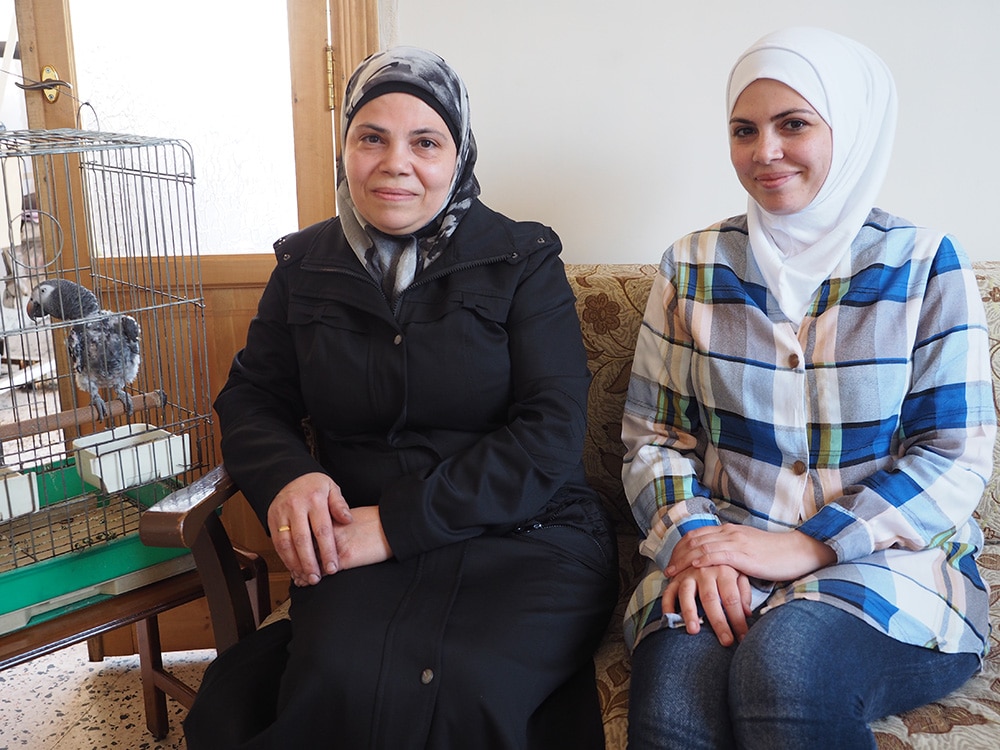
Alaa Dahood and her mother Walaa at their Aleppo apartment. May 4, 2019. Photo: Alex Ray.
“The stress was too much for my father; he was a nervous man and he died from a heart attack in 2013. My mother and I came home in 2017, when Aleppo was safe,” Alaa said as she served spiced coffee in the living room of her modest two-bedroom home.
More than 521,000 war-displaced Aleppans had returned home by the end of 2018, the UN High Commissioner for Refugees (UNHCR) reported. Very few found their properties undamaged. However, in all of Syria, only 42,000 residents got UN ‘rehabilitation’ aid—the assistance category that covered Alaa’s repairs. UN help was largely restricted to short-term emergency relief—the only aid category acceptable to major UN donors who oppose the continued rule of President Bashar al-Assad.
Alaa got no help with her wall but her UN-financed windows are at least made of glass. In Hanano, a suburb of eastern Aleppo previously under rebel control, a young security guard, Mohamed, showed me his family apartment, which overlooks a football field crammed with the skeletons of burned-out buses and cars. Mohamed installed windows made of plastic sheeting last winter, when the temperature fell below freezing. He got the plastic in a UN-supplied Do-It-Yourself ‘shelter kit’ that included pinewood for window frames, fiberboard for doors, expansion foam, nails and tools. 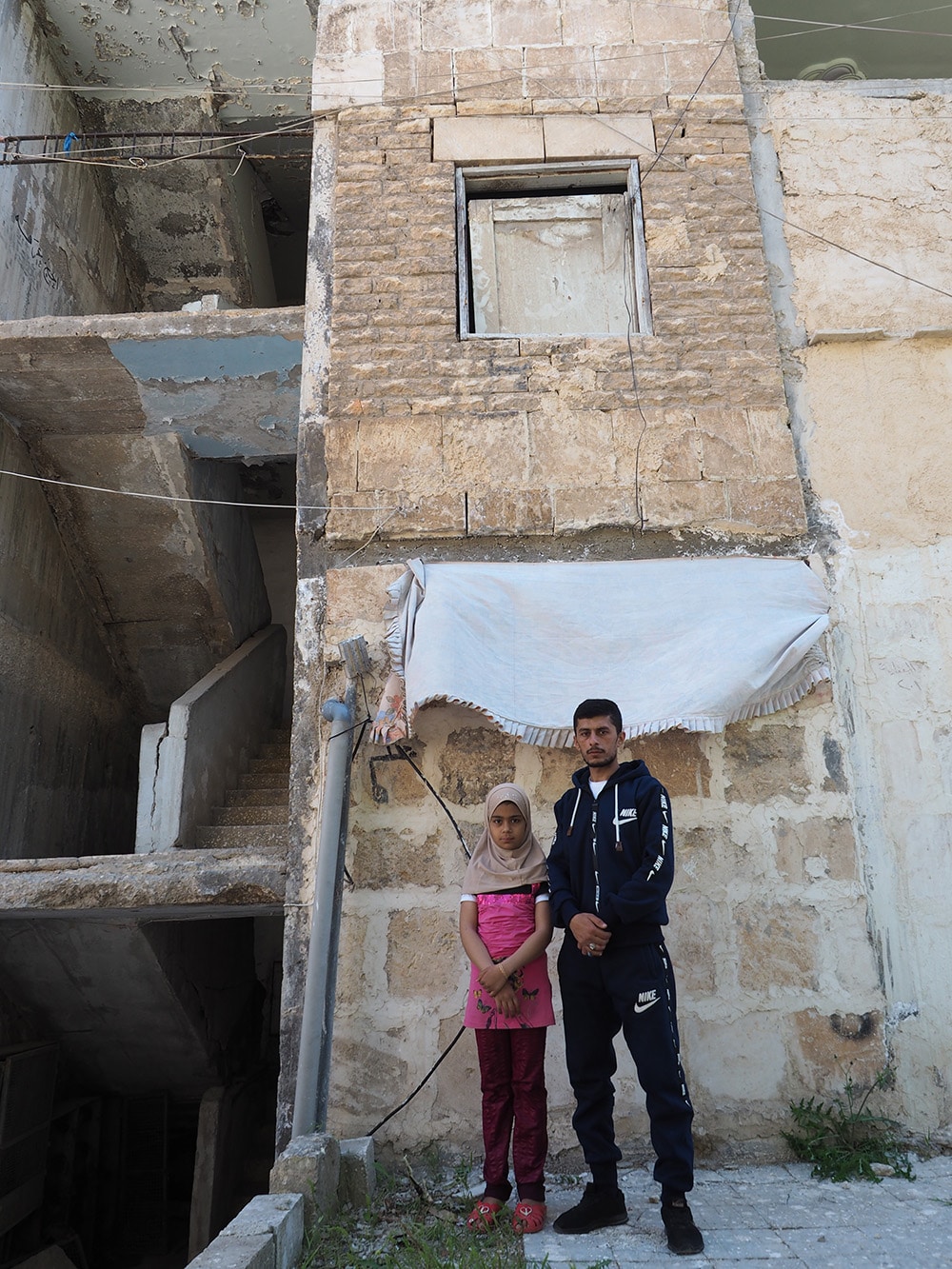
Mohamed and his sister Asma outside their Aleppo apartment block. May 4, 2019. Photo: Alex Ray.
“Plastic is no good for winter but it is better than nothing,” said Mohamed, who did not want his last name published. Despite a severe fuel shortage he managed to buy enough heating oil to warm the bedroom of his frail 13-year-old sister, Asma, for a couple of hours every night. Mohamed has replaced plastic with glass in one window and is putting aside money to do the rest.
Shelter kits come under the heading of short-term emergency aid. The UNHCR says the kits covered about 92,000 Syrians in 2018—more than twice the number who benefited from home rehabilitation. The UN values shelter kits at around US$500 but recipients often sell them for much less or burn the wood for fuel, according to Syrian agencies that implement internationally-funded programs.
One of the UN’s biggest Syrian partners, the Greek Orthodox aid agency Gopa-Derd, refuses to distribute the kits. “We won’t be a part of putting plastic sheets over window frames where there should be glass. Plastic sheets are not going to fix a hole in a wall or keep a family warm in winter,” said Sara Savva, Gopa-Derd’s deputy director.
Another UN partner, the Syria Trust for Development, which managed Alaa’s repairs, wants shelter kit money redirected to rehabilitation. “We did 1000 shelter kits in 2017 then decided no more. They are a waste of time and resources,” said the Trust’s Aleppo director, Jean Maghamez. He added, however, that the Trust’s rehabilitation program covered only 200 Aleppo apartments in 2019 due to UN funding cuts.
A March 2019 joint statement by the governments of the U.S., UK, France and Germany reaffirmed their opposition to any reconstruction assistance in Syria until “a credible, substantive, and genuine political process is irreversibly underway.” The UN’s position was set out in a 2018 internal directive from its Office of Political Affairs, then headed by a U.S. career diplomat, Jeffrey Feltman. “Only once there is a genuine and inclusive political transition negotiated by the parties, would the UN be ready to facilitate reconstruction,” it said.
A negotiated settlement remains distant, however. A UN-backed peace plan drawn up in 2012 is moribund. Separate talks overseen by Assad’s patrons Russia and Iran together with Turkey, which supports elements of the jihadist opposition have also made little progress.
Use of UN funds to rebuild the wall of Alaa Dahood’s apartment would have risked crossing what UN staff in Syria refer to as a “red line” between rehabilitation and reconstruction. Neither term is clearly defined but the line is zealously policed. UN staff in Damascus told me they frequently field questions from governments, other UN donors and “human rights monitors” alert to any infringement of the reconstruction ban.
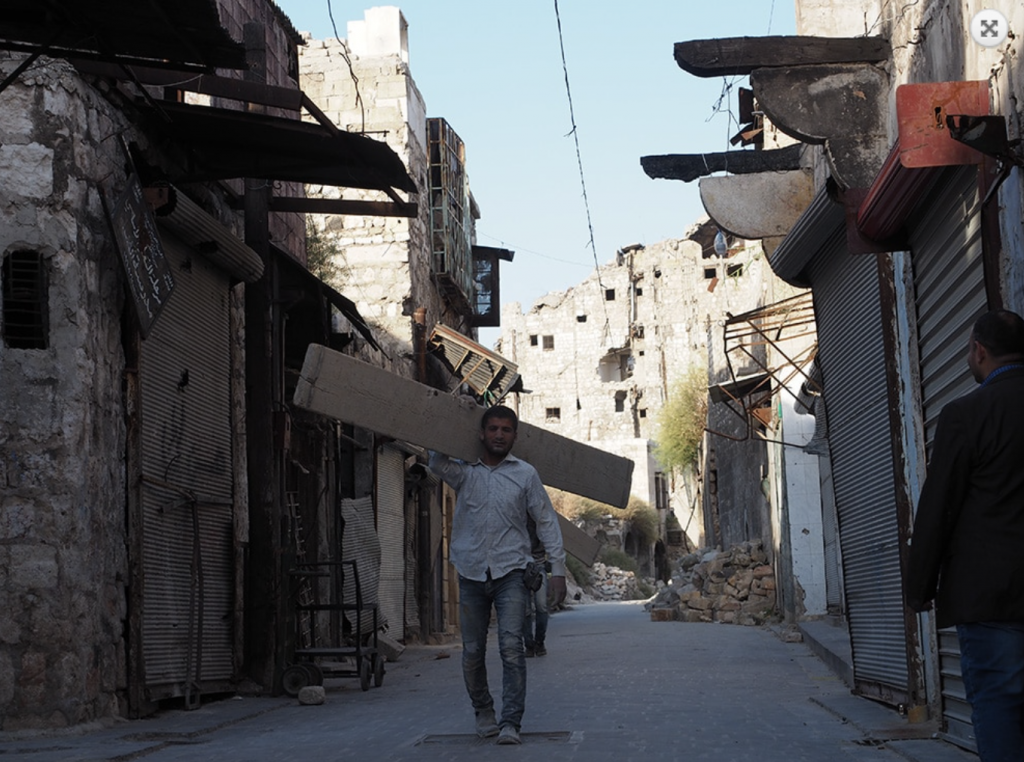
A June report by New York-based Human Rights Watch wagged a disapproving finger at the UN Development Program (UNDP), UN Children’s Fund (UNICEF), Oxfam and others for having rebuilt water sanitation networks and healthcare facilities in government-held Syria. Any project aimed at “rebuilding and sustainable restoration of infrastructure, services, housing, facilities, and livelihoods can carry risks of entanglement in serious human rights abuses,” Human Rights Watch claimed.
To avoid breaching the reconstruction ban, the Syria Trust generally will not rebuild any apartment wall with a hole bigger than two square meters, its lead engineer in Aleppo, Ragheb Al Mudarres, told me. Gopa-Derd wants rehabilitation broadly interpreted to allow homes to be made safe for occupation. “If there is a hole in the wall we block it, if water drips from the ceiling we fix it, if there is no door or windows we install them. Some donors consider this to be reconstruction—we don’t,” Sara Savva said.
UN employees say they follow an unwritten guideline to avoid work on any public building with more than 30 percent structural damage. In one case, the reconstruction ban obliged agencies to reject a neighborhood committee’s plea for help to rebuild three schools. Funds were available, the proposal was technically sound, and the schools were in eastern Aleppo—once hailed by regime-change supporters as a bastion of revolution.
Across the country, 1.75 million children have no school to attend and the need in eastern Aleppo is particularly acute. However, its population apparently can expect little help from former foreign sponsors who walked away after the shooting stopped.
The UN describes Syria’s humanitarian needs as “staggering.” About 5.6 million people have gone abroad—about two thirds as refugees—and about 80 percent of the 18 million who remain need assistance. One third of the housing stock has been destroyed, leaving more than six million people without a permanent home.
Some 7.6 million suffer from an acute lack of clean drinking water and 4.3 million women and children are malnourished. Previously eradicated diseases like polio, typhoid, measles and rubella have returned and one in three children misses out on life-saving vaccines. About 1.5 million people live with permanent, conflict-related disabilities.
In this environment, restrictions on foreign aid are onerous but trade and financial sanctions are lethal. They have “contributed to the suffering of the Syrian people” by blocking imports of anti-cancer drugs, antibiotics and rotavirus vaccines, medical equipment, food, fuel, crop seeds, water pumps and other essentials, the UN Special Rapporteur on sanctions, Idriss Jazairy, reported in 2018. Jazairy called the sanctions “pernicious” and said they obstructed efforts to restore schools, hospitals, clean water, housing and employment.
U.S. measures are the most punitive of overlapping sanctions regimes also applied by the European Union, Japan, Canada, Australia and others. In the words of a former U.S. ambassador to Syria, Robert Ford, the U.S. is waging “economic war” to “strangle to death” Assad’s government. The casualties are the poor, the sick and children—not the political and business elite.
In Damascus, rebel rockets no longer fall on residential districts that have remained loyal to the government through almost nine years of war. However, rather than celebrating the relative safety, Syrians I meet are exhausted by prolonged and worsening economic hardship. “I lived with war every day for seven years and got used to it. I can’t get used to not being able to feed my family,” a state employee said.
EU and U.S. fuel embargoes have hit hard, with nationwide electricity shortages and long queues for rationed petrol and bottled gas. Pharmaceuticals are even harder to obtain than fuel. The World Health Organization says sanctions block the import of anti-cancer drugs, which were subsidized at low prices by the public health system before the war. Sara Savva said medicine for diabetes or heart disease, when available, could cost an average employee a month’s salary. “Forget about chemotherapy or cancer medication—that’s ridiculously expensive,” she said.
Medical equipment is obsolete because the health ministry can’t import parts or update software. Doctors at a major Damascus hospital told Reuters about 10 percent of patients suffering from kidney failure are dying due to the hospital’s inability to source parts for European-made dialysis machines.
Humanitarian exemptions from sanctions supposedly exist but are difficult and costly to obtain. In any case, financial sanctions have isolated the country from global banking and payment systems, which is why foreign ATM and credit cards are useless in Syria. Even international aid organizations are forced to carry cash across the Lebanese border in vehicles or use informal money traders. So tightly drawn is the noose that European banks have refused to open bank accounts for UN staff when the word “Syria” appeared in their job title.
The UN has not endorsed sanctions but their effect on humanitarian aid has been “chilling,” Jazairy said. Exporters, transport companies, and insurers have refused to do any business with Syria for fear of inadvertently violating U.S. sanctions, which are extraterritorial. They apply to any transaction which involves a U.S. connection, such as goods with more than 10 percent U.S. content, or use of U.S. dollars.
In one case, European manufacturers declined to tender for supply of wheelchairs to the UN in Syria. The market is potentially big—about 86,000 Syrians have reportedly lost limbs in the conflict—but not lucrative enough to justify the risk of losing access to U.S. customers. In his 2018 report, Jazairy argued for the release of Syrian central bank assets “frozen” by the EU. His suggestion that the money be set aside to pay for wheat and animal fodder imports to meet the “urgent survival needs of the population” was ignored.
The UN says its Syrian operations merely complement the work of state bodies, which are primarily responsible for meeting the humanitarian emergency. However, the 2019 national budget was set at less than US$9 billion—half the 2011 level—and actual expenditure is almost certainly lower. In eight years of war, GDP has fallen by between one half and two thirds. During December 2019, the Syrian pound fell to around six percent of its pre-war value.
The government still subsidizes fuel, bread, rice and other staples, but, with ministry budgets shrinking, welfare services are increasingly delivered by local non-government organizations such as the Syrian Arab Red Crescent, Gopa-Derd and the Syria Trust. In the Aleppo suburb of Hanano, the Trust runs a UNHCR-funded community center housed in a former Islamic State prison. On the day I visited, a teacher was helping children to model the Earth’s relationship to the Sun with the use of globes and torches. Legal aid was on offer to divorced women seeking child custody and a female doctor was seeing patients.
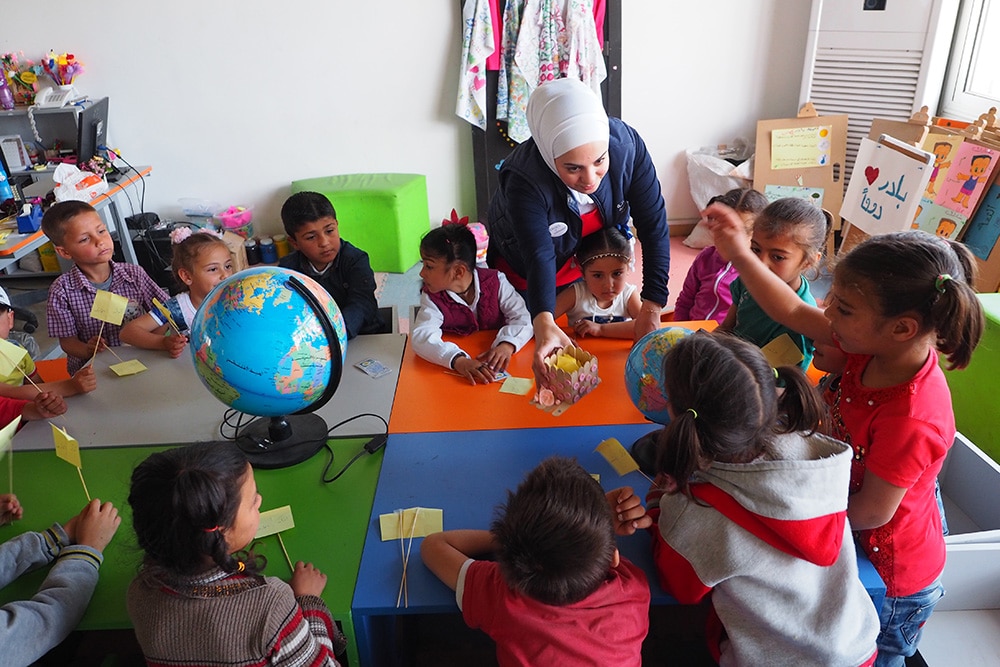
Syria trust for Development remedial class for children in Hanano, a former rebel-controlled zone in Aleppo. May 4, 2019. Photo: Alex Ray.
The center also provides what its English teacher, Walaa Kanawati called a “psychological counselling service.” She said it was in high demand from parents worried about children’s behavior and women subjected to domestic violence. According to Kanawati, the center spends a lot of time trying to teach children and young adults how to disagree without fighting. “We role-play two individuals or two teams and help each side to defend their opinion,” she said. “We pose topics that come out of society, like early marriage, which is a big problem in this area. We’ve got mothers as young as 15.”
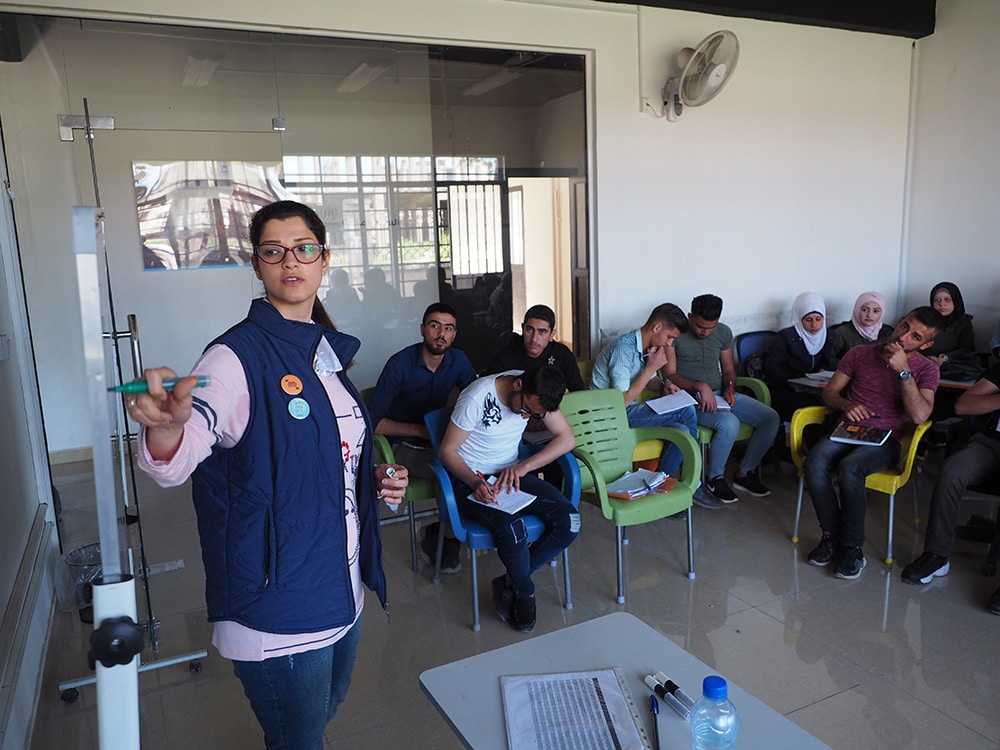
Walaa Kanawati from the Syria Trust for Development teaches English to young Aleppans at a former Islamic State prison in Hanano, eastern Aleppo. May 4, 2019. Photo: Alex Ray.
The Trust was also holding remedial English and math classes for children who missed years of school when living in rebel-held districts. Kanawati said those children struggle to keep up with lessons and often drop out of school.
Alaa Dahood, the primary school teacher from Saif al-Dawla also talked about the challenge of educating students from what she called “the other side.” “They are two, three and four years behind other children and I have to stay back after class to teach them to read and write,” she said. Some got no schooling in opposition-controlled zones while others were only given religious instruction. But, “parents from the other side usually appreciate education. They want their children to be as good as their classmates,” Alaa said.
In Damascus Gopa-Derd operates a UN-funded community center in the eastern suburb of Dweila. The area is an uneasy mix of residents subjected to years of mortar fire from neighboring Ghouta, a jihadist wartime stronghold, and Ghouta refugees who fled air strikes leading up to the army’s takeover in 2018.
Center staff try to promote integration by making services available to both groups. They also encourage boys and girls to attend classes together. Families displaced from opposition areas typically believe sexes should be segregated at a young age and “only boys are important,” said Remi Al Khouri, a Gopa-Derd manager. She said single-sex primary school classes were unknown in Syria before “the crisis,” adding: “We want to show that it is normal for boys and girls to go to class together and play together.”
In the nearby suburb of Kashkoul, another Gopa-Derd community center was focused on combatting sexual abuse of children. According to the center’s manager, Lina Saker, child abuse got worse during the war. I observed a class of boys and girls aged between five and ten engrossed in an exercise on “body safety and personal boundaries”; a female teacher used a wall chart to indicate the body’s “no touch” areas. “Some of these children are already victims and we want them to know it is unacceptable for people to touch certain parts of their body,” Saker said.
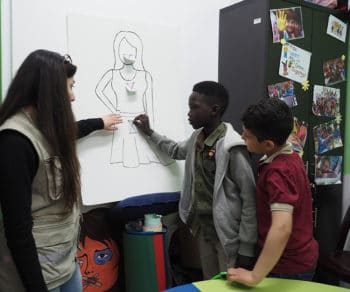
A Gopa-Derd ‘body safety and personal boundaries’ class in the Damascus suburb of Kashkoul. May 10, 2019. Photo: Alex Ray.
Getting children off the streets and into school would make them less vulnerable but displaced families often rely on sons and daughters to earn income. The center is trying to help children as young as nine who sell bread on the street, prepare shisha pipes in cafes, collect rubbish for recycling and help out on construction sites. It arranged medical treatment and schooling for a 14-year-old girl whose health suffered from her work in a charcoal factory.
While the body safety class was in session, the children’s mothers were in a nearby room talking about early marriage. Most had married before the legal age of 18 and a center employee was encouraging them to open up about the physical, emotional and material consequences. “We want to persuade them to stop their own daughters from marrying early and to give them a good education,” Saker said.
About Chris Ray
Chris Ray is an Australian freelance journalist. He can be contacted via chrisray.com.au.

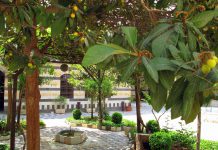
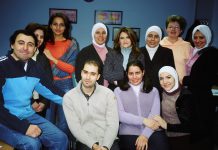
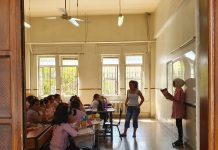
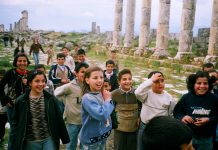

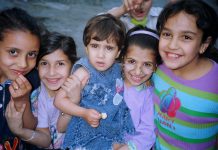



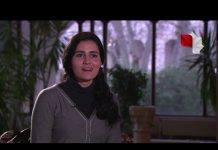
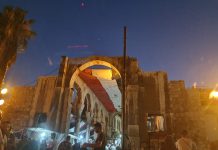


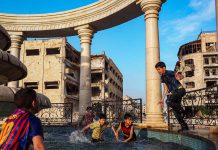
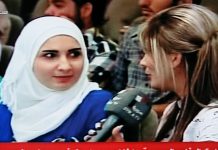


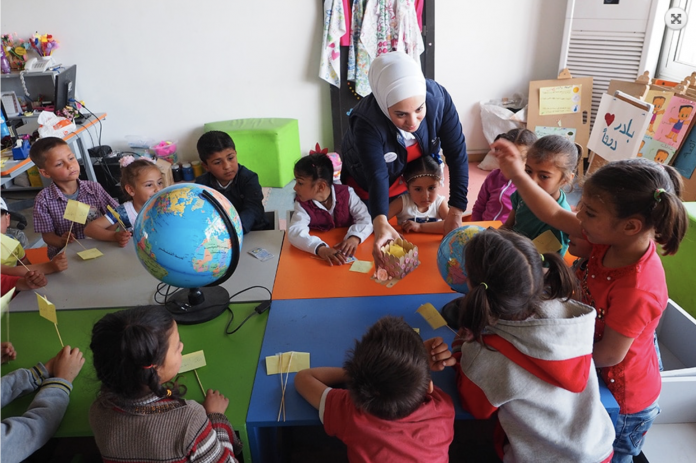
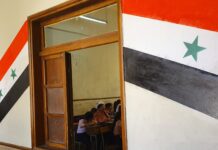






[…] (See earlier Beloved Syria posts on COVID-19 and Sanctions – here and here.) […]
[…] or enquiry. (A freelance Australian journalist, Chris Ray, did visit Syria in 2019 to investigate the impact of sanctions, but his excellent article was ignored by the mainstream […]
[…] or enquiry. (A freelance Australian journalist, Chris Ray, did visit Syria in 2019 to investigate the impact of sanctions, but his excellent article was ignored by the mainstream […]